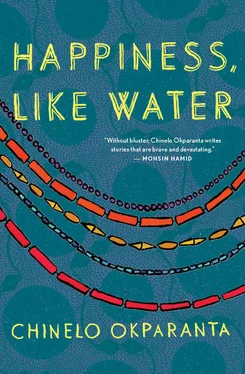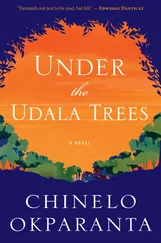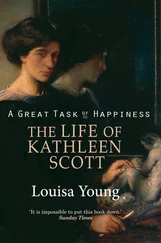But she remains by the door, hopeful and anxious at once. She narrows her eyes in order to see better through the gap. She peers, but Chibuzo and Ezinne are hard to grasp — there are missing portions in their images, those places where darkness has asserted itself.
Still, Nneka peers. She widens her eyes. She blinks as if to blink some clarity into the scene. Finally, she surrenders, resigns herself to only listening.
Ezinne’s moaning continues. It grows louder. Nneka takes in the moaning, takes in the increasing loudness of it. She nods approvingly, happiness overwhelming. She smiles widely, because, unsurprisingly, she hears it the same way that Chibuzo does: sounds of pleasure, rather than sounds of pain.
We gather outside the classroom in the break between morning and afternoon lectures. We stand on the concrete steps, chewing groundnuts and meat pies, all of us with the same dark skin, matching, like the uniforms we wear. All of us, excepting Onyechi of course, because her skin has now turned colour, and we are eager to know how. It is the reason she stands with us, though she no longer belongs. She is now one of the others, one of the girls with fair skin.
Clara looks at Onyechi, her eyes narrow, a suspicious look. Boma chuckles in disbelief. She claps her hands, her eyes widen. She exclaims, ‘chi m o! My God! How fast the miracle!’ Onyechi shakes her head, tells us that it was no miracle at all. It is then that she tells us of the bleach. Boma chuckles again. I think of Eno, of returning home and telling her what Onyechi has said. I listen and nod, trying to catch every bit of the formula. Clara says, ‘I don’t believe it.’ Onyechi kisses the palm of her right hand and raises it high towards the sky, a swear to God, because she insists that she is not telling a lie. Our skin is the colour not of ripe pawpaw peels, but of its seeds. We are thirsty for fairness. But even with her swearing, we are unconvinced, a little too disbelieving of what Onyechi has said.
Hours later, I sit on a stool outside, in the backyard of our house. I sit under the mango tree, across from the hibiscus bush. Ekaite is at the far end of the backyard where the clotheslines hang. She collects Papa’s shirts from the line, a row of them, which wave in the breeze like misshapen flags. Even in the near darkness, I can see the yellowness of Ekaite’s skin. A natural yellow, not like Onyechi’s or some of the other girls’. Not like Mama’s.
Eno sits with me, and at first we trace the lizards with our eyes. We watch as they race up and down the gate. We watch as they scurry over the gravel, over the patches of grass. When we are tired of watching, we dig the earth deep, seven pairs of holes in the ground, and one large one on each end of the seven pairs. We take turns tossing our pebbles into the holes. We remove the pebbles, also taking turns. We capture more and more of them until one of us wins. The game begins again.
The sounds of car engines mix with the sounds of the crickets. It is late evening, and the sky is grey. Car headlights sneak through the spaces between the metal rods of the gate. The grey becomes a little less grey, a little like day. Still, mosquitoes swirl around, and I swat at them, and I swat at myself, and Eno stops with the game, unties one of the two wrappers from around her waist, hands it to me.
At the clothesline, Ekaite is slapping too. She is slapping even more than Eno and I. Her skirt only comes down to her knees; she is not wearing a wrapper with which she can cover her legs.
I say, ‘They bite us all the same.’
Eno says, ‘No, they bite Ekaite more. Even the mosquitoes prefer fair skin.’ The words come out in a mutter. Her tone is something between anger and dejection. I imagine the flesh of a ripe pawpaw. It is not quite the shade of Ekaite’s skin, but it, too, is fair. I throw Eno’s wrapper over my legs.
Emmanuel walks by, carrying a bucket. Water trickles down the sides of the bucket. He stops by Ekaite, and his lips curve into a crooked smile. Then maybe they share a joke, because soon comes the cracking of his laughter, and then hers, surging, rising, then tapering into the night sounds, at the very moment when it seems that their laughter might become insufferable. I look at Eno. Eno frowns.
Emmanuel pours the water out of the bucket, at the corner of the compound where the sand dips into the earth like a sewer. The scent of chlorine billows in the air, and I think of Onyechi and her swearing. I exhume the memory of the morning break, toss it about in my mind, like a pebble in the air, as if to get a feel for its texture, its potential, its capacity for success. And then I tell it to Eno.
When the sky grows black, I hand Eno back her wrapper, and we go into the house. We cut through the kitchen, pass the dining room, head down the corridor, and enter together into the bathroom. Papa and Mama do not catch us. They are closed off in their room.
In the bathroom, we first pour the bleach into the bucket, only a quarter of the way full. Then we watch the water bubble out of the faucet. We inhale and exhale deeply, and the sound of our breathing is weirdly louder than the sound of the running water. We caress the bucket with our eyes as if we are caressing our very hearts. The bucket fills. We turn the faucet off and gaze into the bucket. We are still gazing when Ekaite calls Eno. Her voice booms down the corridor, and Eno runs off quickly to answer, more quickly than usual because she knows well that she should not be in the bathroom with me. Because Eno knows that she must instead use the housegirls’ bathroom, outside in the housegirls’ quarters in the far corner of the backyard. But mostly, when Ekaite calls, Eno runs off quickly, because dinner will be served in just an hour, and Eno will have to help in its preparation.
At the dining table, Papa sits at the head, Mama by his side. The scent of egusi soup enters through the kitchen. Mama picks up her spoon, looks into it, unscrews the tiny canister, still with the spoon in her hand. It is lavender, the canister. The lipstick in it is a rich colour, red like the hibiscus flower; and it rises from the container slowly, steadily, like a lizard cautiously peeking out of a hole. Overhead the ceiling fan rattles and buzzes. The air conditioner hums, like soft snoring. In the kitchen we hear the clang-clanging of Ekaite’s and Eno’s food preparation: of the pestle hitting the mortar, yam being pounded for the soup. Off and on, there is the sound of the running faucet. We listen to the clink of silverware on glass. I imagine the plates and utensils being set out on the granite countertop, and then I hear a sound like the shutting of the fridge, that shiny, stainless-steel door all the way from America. And I wonder if Ekaite ever takes the time to look at her reflection in the door. And if she does, does she see herself in that superior way in which I imagine all fair people see themselves?
A bowl of velvet tamarinds sits at the centre of the table. It is a glass bowl in the shape of a dissected apple, and its short glass stem leads to a small glass leaf. Mama bought the bowl on one of her business trips overseas. She returned from that trip with other things too — silk blouses from Macy’s, some Chanel, bebe, Coach, some Nike apparel. The evening she returned, she tossed all the items in piles on her side of the bed. She tossed herself contentedly, too, on the bed, on a small area on Papa’s side, the only remaining space. She held up some of the overseas items for me to see. One blouse she lifted up closer to me, held it to my chest. It was the yellow of a ripe pineapple. ‘Will lighten you up,’ she said. She threw it to me. I didn’t reach for it in time. It dropped to the floor.
The first magazine arrived two weeks later, Cosmopolitan , pale faces and pink lips decorating the cover, women with hair the colour of fresh corn. Perfect arches above their eyes.
Читать дальше












